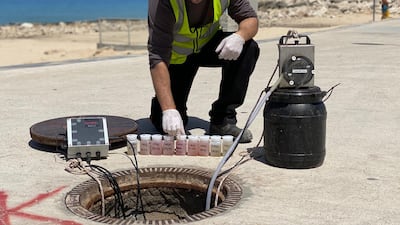Beneath the bustling streets of Israeli cities, machines hidden away inside sewage pipes are tracking coronavirus outbreaks before residents even fall sick.
“Once there is a surge in these sensors, we know that this area is infected,” said Israel Wall, from wastewater management company Kando.
Standing over a nondescript manhole in Kiryat Malakhi, a town in southern Israel, the engineer points out wires dropping into the darkness.
“You can identify it without the population even knowing about it,” he said of samples taken from sewage pipes which are tested for coronavirus.
Israel has experienced record infection rates in recent weeks, with the Health Ministry reporting more than 1.5 million cases in January.
The true infection rate is likely to be significantly higher for the population of 9.4 million, with about 26 per cent of PCR tests returning positive during the last week of January.
To try to give a more accurate overview of the nation’s health, wastewater samples are being taken and tested for coronavirus.
Whether a person knows they are infected or not, they are unwittingly providing a sample every time they use the toilet.

In towns and cities across Israel, the wastewater project is serving as a “complementary tool” to individual testing, said Jenny Gelman, Kando’s head of communications.
“With that kind of technology, you know what is going on all the time,” she said.
The equipment was already being used to detect industrial pollution in Israel before the pandemic. In other countries, it has been used to pick up everything from polio to drug dens.
A pilot coronavirus project was launched in May 2020 in Ashkelon, an Israeli coastal city where at the time officials believed there were few infections.
“The Ministry of Health information they had was that Ashkelon was a ‘green’ city and the only place we had Covid there was the [state-run quarantine] hotel,” said Ms Gelman.
“The wastewater actually showed an infection rate.”
Further trials proved wastewater testing could serve as an early warning system, indicating a coronavirus outbreak days before it showed up in PCR tests.
With each testing station automatically taking a sample twice a week, the method also provides more consistent results than testing centres for residents.
Prof Gertjan Medema, a microbiologist at KWR Water Research Institute in the Netherlands, said PCR testing centres depended on human behaviour.
“Just before Christmas a lot of people went to get tested to see if it’s safe to see family. This is biasing the clinical testing data,” he said of the Netherlands, where wastewater testing is also in use.
“This bias is much less, because everyone goes to the toilet when they need to,” he said of the sewage samples.
Despite its advantages, however, wastewater testing shows overall trends in urban centres rather than pinpointing precisely who is infected.
That is why it will not supplant individual testing, which will still be necessary for people who may have coronavirus and often for those travelling abroad.
Mapping out falling infection rates
The Kando project is reaching all communities with more than 20,000 residents at a cost of millions of dollars per year. But it inevitably misses those living in areas that are not connected to the wastewater system.
Researchers in South Africa are looking for alternatives, such as testing streams, which drain community waste, said Prof Medema.
For countries with a well-developed sewage network, including the US, the technology is helping officials manage the pandemic response.
In Israel, a colour-coded map of Kando’s data shows some areas glowing green where infections have been falling.
“They’re using this data to make decisions – and that’s amazing,” said Mr Wall.












